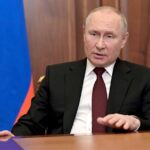Vladimir Putin’s declaration that Russia will recognise the independence of the breakaway regions of eastern Europe was greeted in the US and Europe with dismay and threats of sanctions.
There was also alarm at Putin’s warnings of further action against Ukraine as a whole, questioning the country’s legitimacy and suggesting it presented a direct threat to Russia.
In Washington, the White House announced the prohibition of US investment in or trade with the breakaway republics and potential sanctions against anyone operating within the Moscow-backed territories.
“We will also soon announce additional measures related to today’s blatant violation of Russia’s international commitments,” the White House spokesperson, Jen Psaki, said.
The UK foreign secretary, Liz Truss, said British sanctions would come on Tuesday “in response to their breach of international law and attack on Ukraine’s sovereignty and territorial integrity”.
British prime minister Boris Johnson described the Russian move as an “ill omen” and a “dark sign” that things were moving in the wrong direction.
Joe Biden spoke to his Ukrainian counterpart, Volodymyr Zelenskiy, during the second half of Putin’s rambling near hour-long address, before calling the German chancellor, Olaf Scholz, and French president, Emmanuel Macron, who had been trying to arrange a Biden-Putin summit.
France and Germany are both signatories of the Minsk agreements, a peace deal that will probably be abandoned as a result of the Russian decision.
“The speech was full of grudges and imperial hubris, which signifies a very dangerous turn of events,” a senior eastern European official said. “He definitely doesn’t need those occupied territories, Luhansk and Donetsk, which are in very bad shape and need a lot of money. He wants Ukraine, and it’s probably only the beginning of a larger escalation.”
Ursula von der Leyen and Charles Michel, the presidents of the European Commission and European Council, said: “The recognition of the two separatist territories in Ukraine is a blatant violation of international law, the territorial integrity of Ukraine and the Minsk agreements.”
“The Union will react with sanctions against those involved in this illegal act,” they said.
Alar Karis, the president of Estonia, said: “Estonia will never accept the illegal decision by Russia to recognise Donetsk and Luhansk regions.
“They are an internationally recognised part of Ukraine, like Crimea.
“Clearly, Moscow is not serious about diplomacy but is looking for casus belli.”
Related: Ukraine crisis live: Putin rails against Kyiv and Nato in televised address
The Latvian prime minister, Arturs Krišjānis Kariņš, said: “In a gross violation of international law, under a fabricated pretext, and by spreading false information, Russia seeks to induce a change in Ukraine’s political leadership and foreign policy course by violent means.
“We call on the international community to action through putting in place robust economic sanctions against the Russian Federation and persons responsible for encroachment on Ukraine’s statehood,” Kariņš said.
As Putin staged his security council meeting, and ahead of the Russian leader’s televised address, Joe Biden summoned his top national security officials at the White House, including CIA director William Burns and the chairman of the joint chiefs of staff, Gen Mark Milley.
It appeared likely that Putin’s declaration would mean the cancellation of a potential summit between Biden and Putin The Kremlin had earlier played down the prospect of the summit as “premature”, while the US made clear it would not take place if Russia invaded.


Macron convened an urgent meeting of his national security council, while the Ukrainian foreign minister, Dmytro Kuleba, demanded an emergency session of the United Nations security council. Russia is the current chair of the council, but is obliged to grant a meeting, if a council member state demands it. Ukraine’s allies in the council were waiting for a formal Ukrainian request to be present so they could call for the council meeting.
European officials noted that Russian recognition of the Moscow-backed republics of Luhansk and Donetsk meant the end of the eight-year-old Minsk peace process, and in practical terms would amount to Russian annexation.
At the end of a meeting of EU foreign ministers, the bloc’s foreign affairs chief, Josep Borrell, said a package of prepared EU sanctions would be triggered by Russian recognition of Donetsk and Luhansk territories, but he said the extent of the sanctions would reflect “the level of aggression”.
He told reporters that he would put forward the action at an extraordinary meeting for the EU capitals to sign off should Vladimir Putin follow through on the threat.
Related: Putin’s absurd, angry spectacle will be a turning point in his long reign
Borrell, who said ministers had been closely watching events in Moscow today, suggested that the punitive measures would be appropriate in scale and severity to the action taken by Russia.
He said: “If there is recognition, I will put the sanctions on the table … We have a package prepared. This package has certain components and can be implemented depending on the level of aggression.”
Borrell said recognition by Russia of the independence of the eastern territories of Ukraine would be a breach of international law that the EU would not ignore.
The EU has threatened “severe costs and massive consequences” in the event of a further Russian incursion into Ukraine. The package has yet to be made public but it would involve a block on exports of key electrical components on which Russia is reliant, potentially an import ban on Russian oil and gas, and the freezing of assets of individuals and companies affiliated with the government in Moscow.
A senior official from an eastern European country expressed concern over whether recognition, without a full-scale invasion of Ukraine, would be enough to split European unity.
“It might be not a direct invasion, but instead first of all recognition, then maybe dragging on some days or weeks before Russian so-called ‘peacekeepers’ enter Luhansk and Donetsk occupied territories,” the official said. “Then it’s a grey zone, where you are not sure if that triggers sanctions, especially for for some European Union countries which are further from from the front line.”
A spokesman for the United Nations said: “We underline our call for an immediate cessation of hostilities, maximum restraint, and for all parties to avoid any action and statements that would escalate tensions further. All issues must be addressed through diplomacy.”
The UN announced it was relocating non-essential staff and the families of UN officials posted in Ukraine, while bringing in other staff to support UN operations.
The British foreign minister, Liz Truss, said after talks in Brussels with the Nato secretary-general, Jens Stoltenberg, that western countries were preparing for a “worst-case scenario”. The airlines Lufthansa, KLM and Air France cancelled flights to Kyiv.
After a tense 10-hour meeting of the EU’s 27 foreign ministers, Borrell said Belarus was being annexed by Russia and its government would face the same “massive” sanctions as Moscow should there be an invasion of Ukraine from its territory.
The former Spanish foreign minister said the Belarusian president, Alexander Lukashenko, was allowing his country to become a Russian satellite state.




